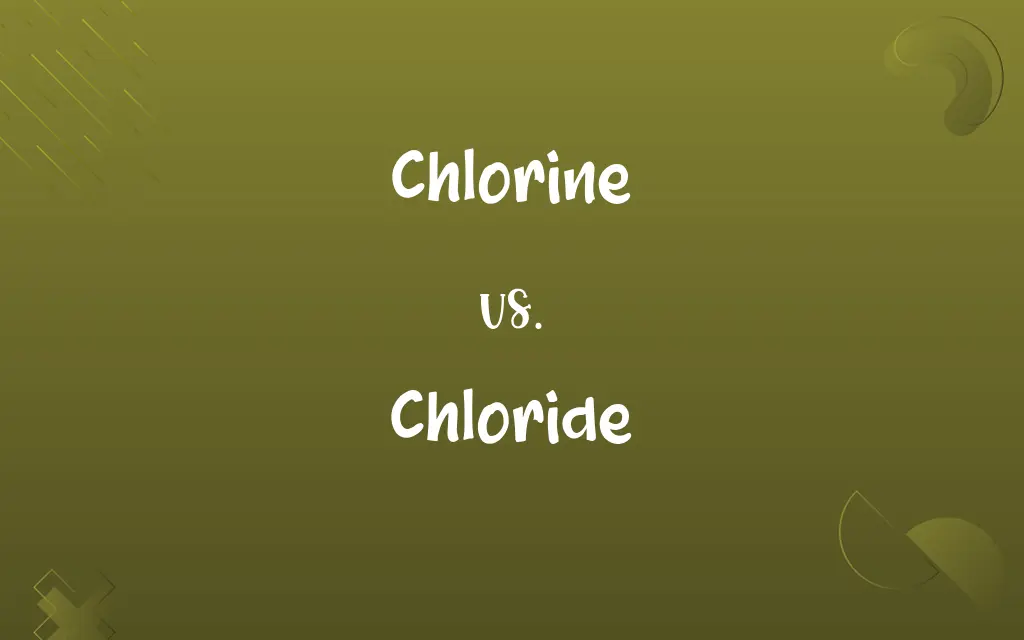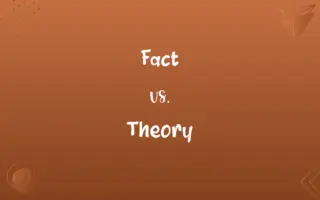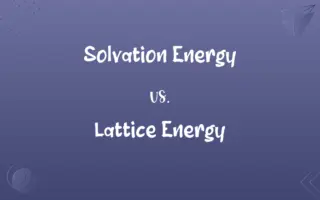Chlorine vs. Chloride: Know the Difference

By Shumaila Saeed || Published on January 1, 2024
Chlorine is a chemical element, a gas at room temperature, while chloride is a negatively charged ion formed when chlorine gains an electron.

Key Differences
Chlorine is a yellow-green gas with a pungent odor, commonly used in disinfection and bleach production. Chloride, on the other hand, is an anion, often found in salts like sodium chloride (table salt), essential for human fluid balance.
Shumaila Saeed
Jan 01, 2024
In its elemental form, chlorine is highly reactive and toxic, making it useful for killing bacteria in water. Chloride ions, being stable and less reactive, play a crucial role in conducting electrical impulses in the body.
Shumaila Saeed
Jan 01, 2024
Chlorine gas is used in the chemical industry for producing products like PVC. In contrast, chloride ions are ubiquitous in nature, present in seawater, and necessary for plant and animal life.
Shumaila Saeed
Jan 01, 2024
The production of chlorine involves electrolysis, where chloride ions are oxidized. This process highlights their chemical interrelationship, though their applications are distinct.
Shumaila Saeed
Jan 01, 2024
While chlorine is a powerful oxidizing agent, chloride ions are typically involved in redox reactions as a spectator ion, showing their different chemical behaviors.
Shumaila Saeed
Jan 01, 2024
ADVERTISEMENT
Comparison Chart
Role in Nature
Used in disinfection, bleaching
Essential in biological functions
Shumaila Saeed
Jan 01, 2024
Industrial Use
In manufacturing, like PVC production
Common in salts, like sodium chloride
Shumaila Saeed
Jan 01, 2024
ADVERTISEMENT
Chlorine and Chloride Definitions
Chlorine
Chlorine is a potent irritant, harmful in high concentrations.
Inhaling chlorine gas can cause respiratory issues.
Shumaila Saeed
Dec 19, 2023
Chloride
Chloride is essential for maintaining fluid balance.
Chloride ions are a key part of the body's electrolytes.
Shumaila Saeed
Dec 19, 2023
Chlorine
Chlorine is involved in water treatment processes.
Drinking water is often chlorinated to eliminate pathogens.
Shumaila Saeed
Dec 19, 2023
Chloride
Chloride is a common component in various salts.
Potassium chloride is used as a salt substitute.
Shumaila Saeed
Dec 19, 2023
Chlorine
Chlorine is a greenish-yellow gas, used as a disinfectant.
Pools are often treated with chlorine to keep them clean.
Shumaila Saeed
Dec 19, 2023
ADVERTISEMENT
Chloride
Chloride ions are involved in electrical conductivity.
Nerve impulses rely on the movement of chloride ions.
Shumaila Saeed
Dec 19, 2023
Chlorine
Chlorine is used in the production of plastics and solvents.
PVC, a common plastic, is made using chlorine.
Shumaila Saeed
Dec 19, 2023
Chloride
Chloride is a negatively charged ion of chlorine.
Sodium chloride, table salt, contains chloride ions.
Shumaila Saeed
Dec 19, 2023
Chlorine
Chlorine is a chemical element with the symbol Cl.
Chlorine is found on the periodic table between sulfur and argon.
Shumaila Saeed
Dec 19, 2023
Chloride
Chloride is present in seawater and many minerals.
The salinity of oceans is partially due to chloride.
Shumaila Saeed
Dec 19, 2023
Chlorine
A highly irritating, greenish-yellow halogen element, existing as a diatomic gas, Cl2, and capable of combining with nearly all other elements, produced principally by electrolysis of sodium chloride and used widely to disinfect water, as a bleaching agent, and in the manufacture of many important compounds including chlorates, sodium hypochlorite, and chloroform. Atomic number 17; atomic weight 35.453; freezing point -100.5°C; boiling point -34.04°C; specific gravity 1.56 (-33.6°C); valence 1, 3, 5, 7. See Periodic Table.
Shumaila Saeed
Dec 13, 2023
Chloride
Univalent anionic chlorine, or a compound of chlorine, especially a binary compound of chlorine with a more electropositive element.
Shumaila Saeed
Dec 13, 2023
Chlorine
A toxic, green, gaseous chemical element (symbol Cl) with an atomic number of 17.
Shumaila Saeed
Dec 13, 2023
Chloride
(chemistry) any salt of hydrochloric acid, such as sodium chloride, or any binary compound of chlorine and another element or radical
Shumaila Saeed
Dec 13, 2023
Chloride
A binary compound of chlorine with another element or radical; as, chloride of sodium (common salt).
Shumaila Saeed
Dec 13, 2023
Chlorine
One of the elementary substances, commonly isolated as a greenish yellow gas, two and one half times as heavy as air, of an intensely disagreeable suffocating odor, and exceedingly poisonous. It is abundant in nature, the most important compound being common salt (Sodium chloride). It is powerful oxidizing, bleaching, and disinfecting agent. Symbol Cl. Atomic weight, 35.4.
Shumaila Saeed
Dec 13, 2023
Chlorine
A common nonmetallic element belonging to the halogens; best known as a heavy yellow irritating toxic gas; used to purify water and as a bleaching agent and disinfectant; occurs naturally only as a salt (as in sea water)
Shumaila Saeed
Dec 13, 2023
Repeatedly Asked Queries
How is Chlorine used in water treatment?
Chlorine is used to kill bacteria and purify water.
Shumaila Saeed
Jan 01, 2024
Is Chlorine harmful to humans?
In high concentrations, chlorine gas can be toxic and irritating.
Shumaila Saeed
Jan 01, 2024
What is Chlorine?
Chlorine is a yellow-green gas, a chemical element used in disinfection.
Shumaila Saeed
Jan 01, 2024
What is Chloride?
Chloride is a negatively charged ion formed from chlorine.
Shumaila Saeed
Jan 01, 2024
What role does Chloride play in the human body?
Chloride helps maintain fluid balance and aids in nerve function.
Shumaila Saeed
Jan 01, 2024
What is chlorine's role in the production of PVC plastic?
Chlorine is a key component in the production of polyvinyl chloride (PVC) plastic.
Shumaila Saeed
Jan 01, 2024
Does chlorine have a distinct odor?
Yes, chlorine gas has a distinctive and pungent odor that is often associated with swimming pools.
Shumaila Saeed
Jan 01, 2024
Can Chlorine exist naturally?
Chlorine is rarely found in its elemental form in nature due to its reactivity.
Shumaila Saeed
Jan 01, 2024
Is chlorine a naturally occurring element in the human body?
Yes, small amounts of chlorine are present in the human body, primarily in the form of chloride ions.
Shumaila Saeed
Jan 01, 2024
Where is Chloride commonly found?
Chloride is commonly found in salts like sodium chloride.
Shumaila Saeed
Jan 01, 2024
Can chloride ions be detected in water testing?
Yes, chloride ions can be detected through water testing, which is important for monitoring water quality.
Shumaila Saeed
Jan 01, 2024
Can chlorine gas support combustion?
No, chlorine gas is not combustible and can act as a fire suppressant.
Shumaila Saeed
Jan 01, 2024
Are chloride ions involved in nerve function?
Yes, chloride ions are involved in nerve signal transmission and muscle function.
Shumaila Saeed
Jan 01, 2024
Can high chloride levels in drinking water be harmful?
Elevated chloride levels in drinking water can affect taste but are generally not harmful to health when within safe limits.
Shumaila Saeed
Jan 01, 2024
Is chloride used in chemical reactions and compounds?
Yes, chloride ions are used in various chemical reactions and form compounds with other elements and ions.
Shumaila Saeed
Jan 01, 2024
Share this page
Link for your blog / website
HTML
Link to share via messenger
About Author
Written by
Shumaila SaeedShumaila Saeed, an expert content creator with 6 years of experience, specializes in distilling complex topics into easily digestible comparisons, shining a light on the nuances that both inform and educate readers with clarity and accuracy.









































































